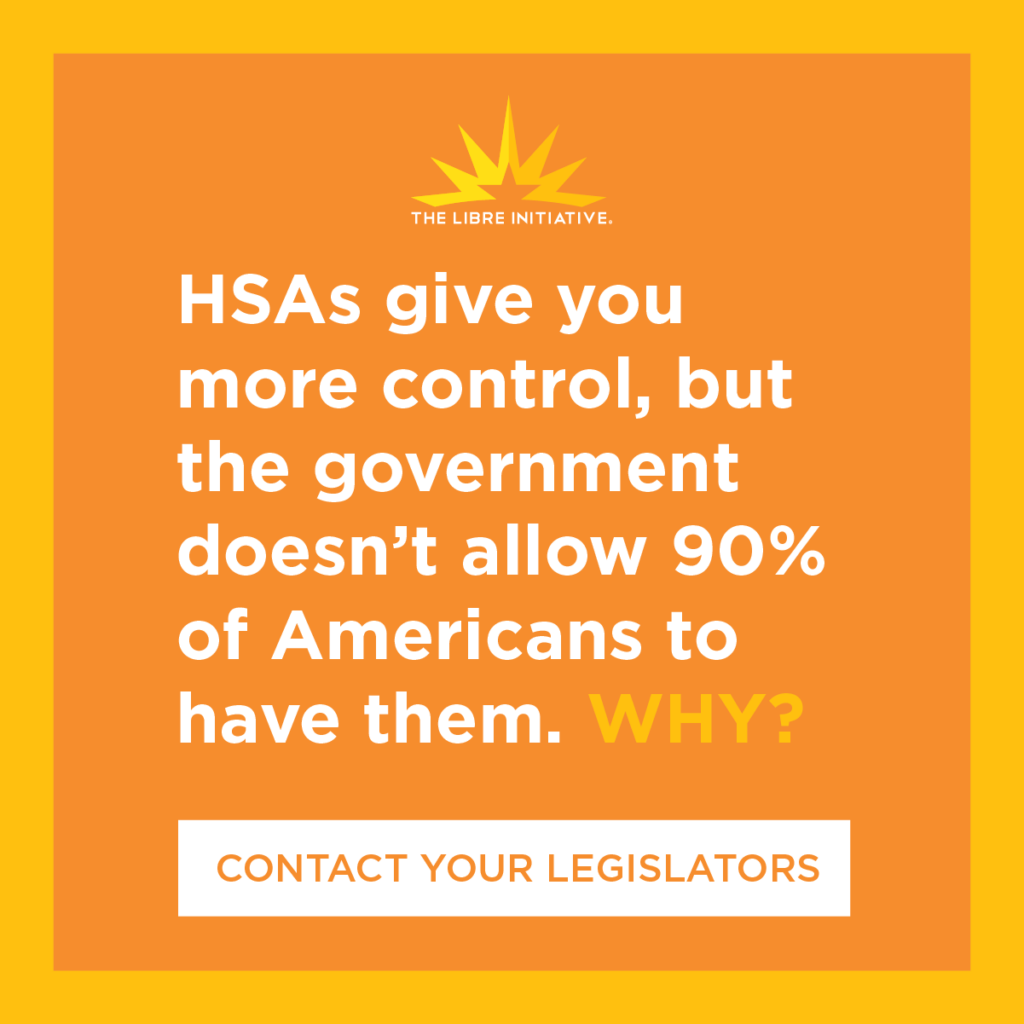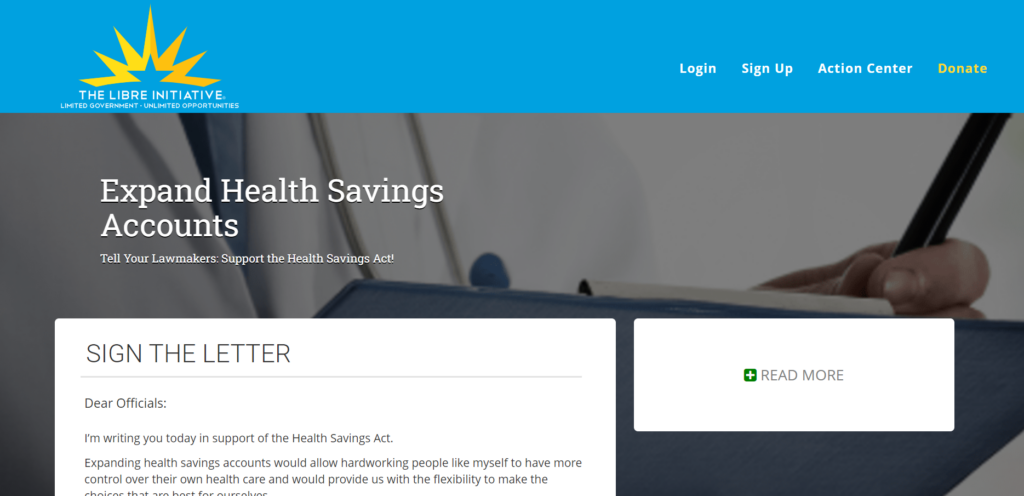How HSAs could reduce costs and improve the quality of health care for Hispanics

Your focus when you’re sick should be on getting the help you need, not worrying about how you’ll cover the cost of your doctor’s bills or if you’ll even be able to find quality care.
However, about half of the Hispanic community report that they lack access to quality health care, and about a quarter of Latinos are not covered by any type of insurance.
It’s time to start pushing for health care reform that puts the personal needs of Latinos first and an important first step in doing so, is for Hispanic Americans to gain more control over their care.
One viable solution is using funds from a health savings account (HSA) that, if working correctly, allows you to spend your health care dollars where and when you want to.
A tax-free HSA is a powerful financial tool that enables you to make your health care dollar go farther, and to build up a health care nest egg.
However, as it stands now, thanks to government rules and restrictions, only about one in ten Americans effectively has access to an HSA, and current rules unduly limit in how people can use their account.
Removing these unnecessary regulations and requirements currently attached to HSAs is a huge stepping stone to providing Hispanic Americans with access to more affordable, higher quality care.
Here’s what you need to know about the benefits of HSAs and how making these accounts available to everyone will reduce costs and improve the quality of health care for Hispanics.
Why HSAs are an effective solution for reducing costs and improving the quality of health care
A health savings account is an effective solution in reducing costs and improving the quality of health care for multiple reasons.
For one, the money you put into an HSA is completely tax-free.
In 2022, the individual contribution limit to an HSA was set at $3,650 and $7,300 for families.
That means if you put $7,300 into a health savings account this year for your family, all of that money can be deducted from your taxable income at the end of the year.
Secondly, the money you put in your HSA can be used for all sorts of health care related expenses.
For example, you can use HSA funds for everything from bandages, contact lenses, and pregnancy test kits to lead paint removal in your home.
Importantly, you can use your HSA for items, services, and doctors that your health insurance doesn’t cover.
Thirdly, if you don’t use your HSA money that you put in your account over the course of the year, you retain the amount you’ve saved and can continue adding to it.
Growing your HSA year after year ensures you have a hearty fund to help you pay for any procedure that your insurance may not fully cover.
For example, assuming a real interest rate of 6% and annual net HSA contributions of $2,000, the amount in your account would equal about $78,000 after twenty years, $168,000 after thirty years, and $328,000 after forty years.
The Latino population is eligible to use HSAs as a health care cost solution
While efforts are underway to make HSAs available to all, HSAs aren’t currently available for everyone in the U.S.
To qualify for an HSA, you must be currently insured and the insurance policy you have must be qualified as a “high deductible” health plan.
While these days most insurance plans come with a high deductible, few high-deductible plans are actually HSA-qualified.
The only way you can start using a health savings account in 2023 is if your deductible is $3,850 or more for yourself or $7,750 or more for your family.
Plus, your insurance must meet a host of additional requirements, regarding such matters as cost-sharing amounts and preventive care definitions.
We must begin to reimagine health care, and work to enact policies that remove barriers and strengthen the way health care is being delivered to patients. pic.twitter.com/bzSn0Cskan
— The LIBRE Initiative (@LIBREinitiative) April 8, 2022
Sadly, none of these rules and requirements is necessary. Their only purpose, it would seem, is to limit HSA access.
A study by Health Affairs found that Hispanic Americans are between seven and eight times less likely to have an HSA-eligible plan than other Americans.
With that in mind, it’s no surprise that many Hispanics know little about HSAs or see themselves as likely ineligible for using HSAs as a health care cost solution.
How current regulations on HSAs disproportionately harm the Hispanic community
While HSAs themselves reduce income and racial disparities in health care, overly restrictive insurance rules and current bureaucracy regarding the use of HSAs only furthers income and racial disparities.
Here are a few examples of how the strings attached to HSAs disproportionately harm the Hispanic community.
1. Ineligible due to a lack of insurance
Without insurance, you aren’t eligible for an HSA.
This is particularly problematic for Hispanics because, as stated by the United States Office of Health Policy, “Latinos have consistently been overrepresented in the uninsured population.”
In fact, the uninsured rate of Latinos is double that of non-Latino Whites. While it makes logical sense for all Americans to be able to build hearty health savings, regardless of their insurance status, this isn’t currently the case in the U.S.
2. Serving our country, losing HSA opportunities
Hispanics are the fastest growing minority population serving our country in the military. However, being a retired or active duty military member makes people ineligible to contribute to a HSA.
That’s over 200,000 Hispanic American military members, not to mention all their family members, who are also covered by Tricare and therefore ineligible.
3. Retired? Too bad.
As mentioned, an HSA can grow into a sizable nest egg for retirement. That can be an absolute life-saver for seniors.
Indeed, the average 65-year-old couple today faces more than $300,000 in lifetime medical costs for items and services not covered by Medicare. And yet current federal rules actually prohibit seniors from opening an HSA or putting money into an existing one!
4. Not all health-related costs are currently covered with HSA funds
Your health savings account should allow you to pay for any health-related expense, from preventative care and basic health goods to seeing any doctor you choose. However, this isn’t how HSAs are currently structured in the U.S.
Here are a few of the restrictions of HSAs that are problematic for Hispanic Americans, specifically:
Preventative care
Preventative care reduces the risk of health issues down the line. However, HSAs don’t cover all of the preventative care options that impact the Hispanic community.
For example, nearly 80% of Hispanic women struggle with obesity, yet HSAs can’t be used to cover the cost of many weight loss programs, nutritional supplements, or health club membership dues.
Meeting the needs of lower income families
About 16% of Hispanic Americans live in poverty, yet many of the HSA regulations favor paying for the expenses of the wealthy, rather than the needs of people who could use the advantages of these savings the most. For example, au pair services are covered by HSAs but baby bottles and baby wipes aren’t.
Seeing a doctor you trust
You may not even be able to use your own HSA savings to see the doctor of your choice because current IRS rules don’t allow people to pay for direct primary care with their savings.
The IRS’s “no DPC for HSA owners” rule means you may not have access to doctors like Dr. Cindy Cedillo-Ruiz in Houston, who opened a Direct Primary Care clinic specifically aimed at helping the Latino community.
Dr. Cedillo-Ruiz told Venture Online that she wants, “a future where quality health care isn’t a privilege and my community isn’t dependent on the purse strings of insurance or government.”
However, the government’s arbitrary lines drawn in the sand of what qualifies as an HSA eligible expense and what doesn’t pushes us further away from making her health care cost solutions into a reality.
More accessible and less restrictive HSAs will provide Hispanic Americans with more personal control over their health care
For Latinos currently on a high-deductible insurance plan, HSAs can be incredibly useful for reducing costs and improving the quality of health care.
These powerful accounts offer more control over personal health care decisions, and much needed flexibility.
However, HSAs need to be made more widely available and less restrictive so all Hispanics can benefit from this health care cost solution.
Do you believe the Hispanic community deserves flexibility and choice in their health care?
Contact your lawmaker today and urge them to support universal HSAs.





